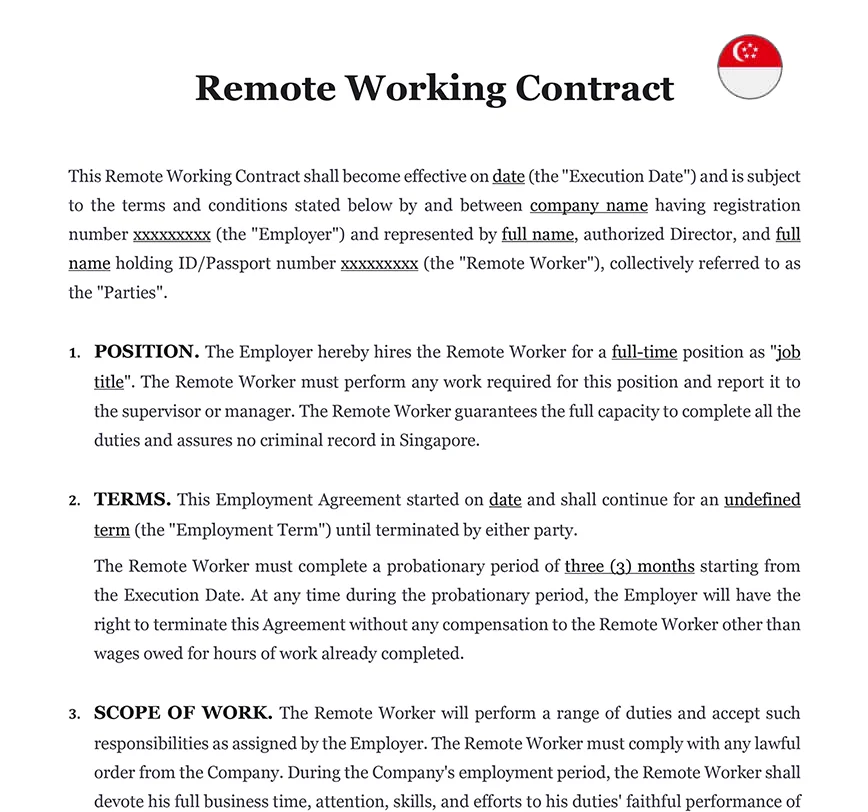Ready to use legal template
Drafted by experienced lawyers
Compliant with Singapore law
Ready to use legal template
Drafted by lawyers
Compliant with Singapore law
Learn more about Remote Working Contract in Singapore
Are you looking for a Remote Working Contract that ensures a smooth and productive work arrangement? Look no further. Themis Partner provides a comprehensive and customizable Remote Working Contract designed by experienced lawyers in Singapore. Our legal template covers crucial aspects such as performance evaluation, communication and collaboration guidelines, equipment and technology provisions, as well as data security and confidentiality measures. With our easy-to-edit document, you can confidently establish clear expectations and guidelines for remote working, ensuring a seamless experience for both employers and employees. Stay compliant with the law and maintain a productive remote workforce with our Remote Working Contract.
Table of contents
-
What is a Remote Working Contract?
-
What should be included in a remote working contract?
-
How does the Employment Act address remote working arrangements?
-
What are the tax implications when working remotely?
-
How does it differ from traditional employment contracts?
-
Can an employer terminate a remote working contract?
-
Are remote workers entitled to the same benefits and protections?
-
What are the considerations for intellectual property rights?
What is a Remote Working Contract?
A remote working contract in Singapore refers to an employment agreement between a company and an individual who works remotely or from a location outside the company’s physical premises. In recent years, remote work has gained popularity, and Singapore has recognized the importance of offering flexible work arrangements to attract and retain talent.
A remote working contract outlines the terms and conditions of employment, including the rights and responsibilities of both the employer and the remote worker. It typically covers aspects such as working hours, performance expectations, communication protocols, data security measures, and compensation details.
ℹ️ By formalizing the remote work arrangement through a contract, companies in Singapore can ensure clarity and compliance while providing opportunities for individuals to work effectively and efficiently from their preferred locations.
What should be included in a remote working contract?
A remote working contract should include several key elements to ensure clarity and protection for both the employer and the remote worker. Here are some important provisions to consider:
1. Employment Terms
Clearly outline the nature of the employment relationship, including the start date, duration, and any probationary period.
2. Remote Working Arrangement
Specify that the employee will be working remotely and identify the location(s) from which they will work.
3. Working Hours and Schedule
Define the expected working hours and days, including any flexibility or variations permitted.
4. Performance Expectation
Set out the performance standards, targets, and deliverables that the employee is expected to meet while working remotely.
5. Equipment and Resources
Address the provision and maintenance of necessary equipment, such as laptops, software, and internet connectivity, as well as any reimbursement policies.
6. Communication and Reporting
Establish communication channels, frequency, and reporting requirements to ensure effective collaboration and accountability.
7. Confidentiality and Data Protection
Include clauses on safeguarding company information, data security, and compliance with relevant data protection laws.
8. Intellectual Property Rights
Specify the ownership and protection of intellectual property created by the employee during the course of remote work.
9. Leave Entitlements and Benefits
Detail the employee’s entitlement to annual leave, medical benefits, insurance coverage, and any other applicable benefits.
10. Termination and Dispute Resolution
Define the conditions under which either party can terminate the contract, including any notice period, as well as procedures for resolving disputes.
How does the Employment Act address remote working arrangements?
The Employment Act in Singapore, which serves as the main employment legislation, does not specifically address remote working arrangements. However, it does provide certain protections and entitlements that are applicable to remote workers.
The Act covers various aspects of employment, such as the payment of salary, working hours, annual leave, sick leave, and termination of employment. These provisions apply to both office-based and remote workers, ensuring that employees engaged in remote work are entitled to the same basic rights and benefits as their counterparts in traditional work settings.
Employers are expected to comply with the provisions of the Employment Act when managing remote working arrangements, including the payment of salary within the stipulated timeframes, ensuring reasonable working hours, granting adequate rest days, and adhering to leave entitlements.
ℹ️ It is important for employers and employees to understand and align their remote working arrangements with the relevant provisions of the Employment Act to ensure a fair and compliant work environment.
What are the tax implications when working remotely?
The tax implications when working remotely can vary depending on the specific jurisdiction and individual circumstances. In many cases, the location where the work is performed becomes a crucial factor in determining tax obligations. When working remotely, individuals may be subject to tax laws in both their home country and the country where they are physically working. Some countries have specific rules and agreements in place to address these situations, such as double tax treaties that prevent double taxation.
- Remarks:
It is important for individuals working remotely to understand the tax regulations of both their home country and the country where they are working, as well as any applicable tax residency rules. Certain expenses related to remote work, such as home office expenses, may be eligible for tax deductions or reimbursements in some jurisdictions.
How does it differ from traditional employment contracts?
Remote working contracts can differ from traditional Employment Contract in several ways.
| ➤ They explicitly outline the arrangement where the employee works remotely, typically from their own home or a location of their choosing. This differs from traditional employment contracts where employees typically work at a specific physical workplace designated by the employer. |
| ➤ They may include provisions regarding the use of technology and equipment necessary for remote work, such as laptops, software, and internet connectivity. Traditional employment contracts may focus more on the responsibilities and expectations associated with working at a specific physical workplace. |
| ➤ They may also address issues such as communication protocols, reporting structures, and performance expectations unique to remote work arrangements. |
| ➤ They may require additional clauses related to data protection, confidentiality, and cybersecurity due to the remote nature of the work. |




